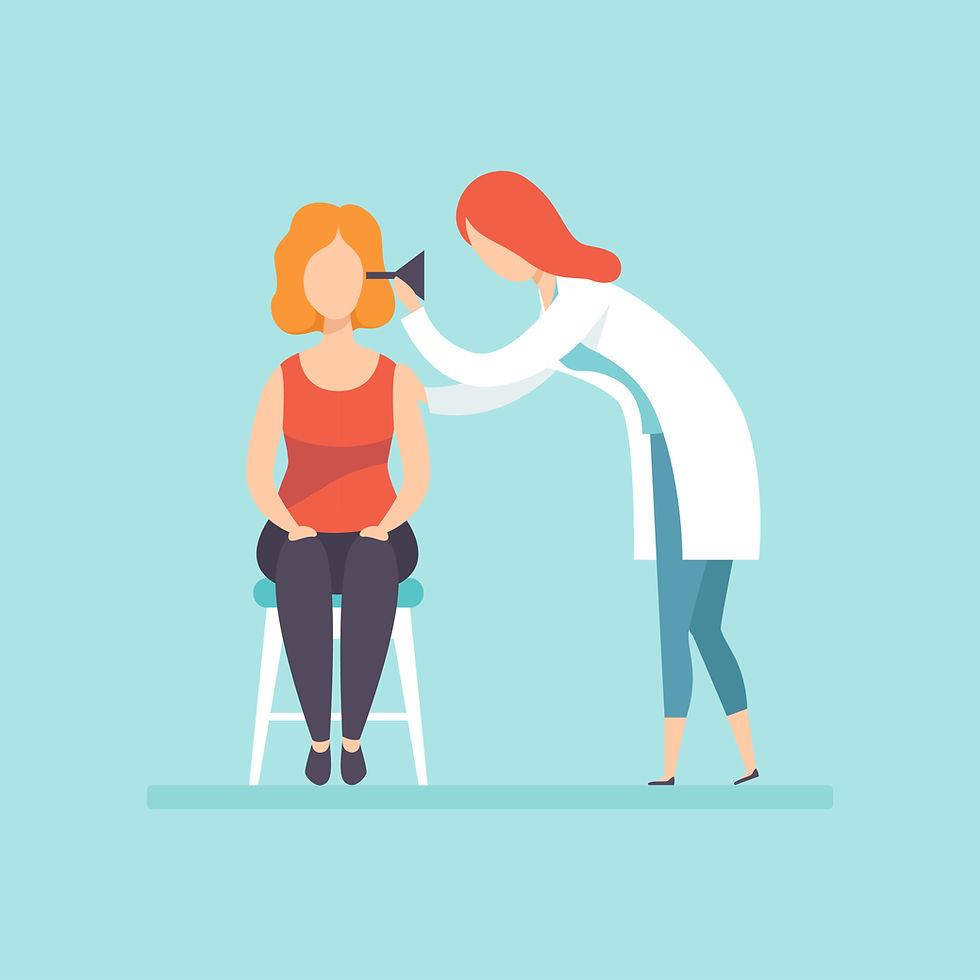Why are my ears so itchy?
- Catherine Mills
- Jul 24, 2023
- 3 min read
Updated: Nov 14, 2023
Many people come into clinic complaining that their ears itch. When you look for research into this, there is very little. This little pocket of skin seems to be overlooked somewhat, even dermatologists have little input into a symptom that can be incredibly frustrating.
So why do our ears itch and what can we do, safely, to stop the itch?

Human studies have shown that nerve fibres in the ears detect and signal an itch and send that information to the central nervous system. These nerve fibres are part of a group of fibres that carry sensory information such as pain, warmth and the itch itself.
One reason for itching is dryness in the ears. A normal ear canal has a fine layer of natural body oil. However some ears produce no wax which can leave the skin inside our ears dry and itchy. For others. they compulsively clean their ears stripping away all those natural oils and leaving the ears dry. If our ears are too dry, the skin inside tends to flake and you can end up with an accumulation of dead skin in the ear canal. This can be extremely itchy but in worse cases if water gets trapped behind this skin, it can create a perfect breeding ground for infection.
The skin inside our ear canal is sensitive. If you were to rub a cotton bud on the skin on your hand for long enough, you would make it bleed. With that in mind it is safe to say that rubbing a cotton bud inside your ear canal will almost certainly damage the skin. I refrain from calling them cotton ear buds because there is no medical reason why you should ever put one in your ears.
Given how sensitive our ear canals are then, it is not surprising that the slightest accumulation of debris in your ears may be felt as an itching sensation. A ball of wax or even a tiny hair clipping can leave your ear feeling itchy. Worse still are other items that can be easily and accidentally inserted into our ears such as peas, batteries, insects and cotton buds. The discomfort caused by such items can at best be very painful and at worst require a hospital admission. Over a 6 year period, a total of 17,325 aural foreign bodies were removed from the ears of adults and children in England (Hospital Episode Statistics 2010-2016 - Department of Health Records).
If you wear hearing aids, your earmoulds can irritate your skin too. Some earmoulds are what we call 'open-ear' fits which use silicone domes but others can be made of acrylic and can be irritating to your ears and in some cases cause allergic reactions. Ask your audiologist if you suspect the earmould is causing an irritation. Using hypoallergenic materials is a simple remedy with potentially huge benefits. In more severe cases there are hearing implant options such as bone conducting implants and middle ear implants that can provide hearing rehabilitation without the need to wear an earmould in your ear at all. These require a full assessment by an Auditory Implant Team and would be a last resort in some cases.
Some patients suffer with skin diseases such as dermatitis, eczema and psoriasis. They are easy to diagnose and can be treated with topical creams. This may only require a visit to your GP.
So how can you stop the itch?
For patients who simply lack ear wax, a couple of drops of olive oil can really help to lubricate and moisturise the ear canal and relieve itching. For those who find it impossible to stop trying to clean their own ears, visits to an ear specialist for aural microsuction (ear wax removal) can really help. Again, olive oil drops over a couple of consecutive nights every month can keep the ear healthy and also soften the wax as it is building up and help with the self cleaning process. This is certainly the advice I would give to patients who need to have their ears cleaned annually.
Over the counter treatments like 'Ear Calm Spray' can be very effective and I have seen many patients who have used Ear Calm with significant improvements.
As mentioned, for those patients with a more persistent problem, a visit to your GP would be advised as a prescription for hydrocortisone ear drops may be indicated.
If you have any concerns about your ears it is always advisable to seek advice particularly if you have any of the above symptoms. It is always better to have your ears checked as in most cases, symptoms can be relieved with relative ease.
And remember.....nothing smaller than your elbow in your ears!





Comments